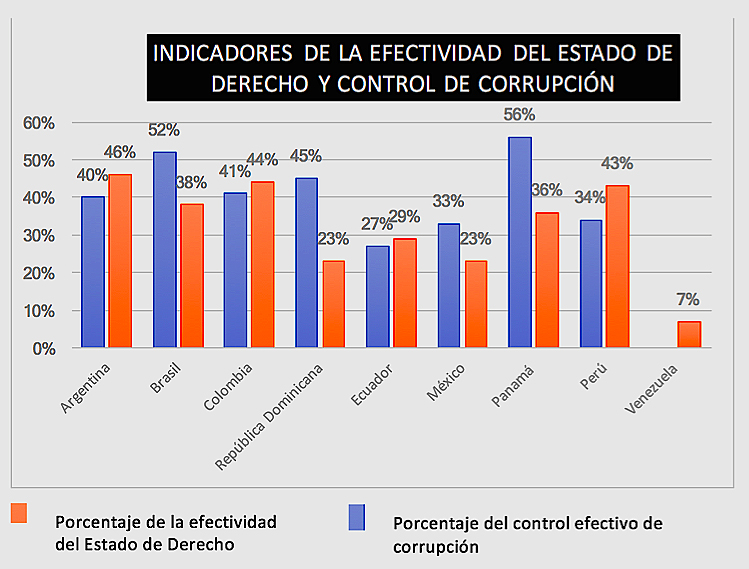High levels of corruption in public works projects and impunity from justice in the Latin American region continue to challenge attempts to successfully eradicate fraud in government dealings
Odebrecht, one of the most important construction and engineering companies in Brazil, confessed to offering numerous bribes to political leaders, political parties and public officials. Its major aim was to obtain contracts for major public infrastructure projects within the region. The investigation has revealed a complex network of bribery that has become one of the largest corruption scandals in Latin American history. The B boosts in the region, thanks to commodities' "golden decade," occurred within a weak precedent for the Rule of Law and therefore lax anti-corruption measures permitted widespread illicit profits for major government contractors and inflated costs for tax payers.

ARTICLE / Ximena Barria [English version] [Spanish version].
Odebrecht is a Brazilian conglomerate that through several operational headquarters conducts businesses in multiple industries. It dedicates to areas such as engineering, construction, infrastructure and energy. Its headquarters is located in Brazil in the city of Salvador Bahia. The company operates in 27 countries of Latin-America, Africa, Europe and the Middle East. Throughout the years, Odebrecht has concluded contracts with governments to build public works, with the majority of its projects in the Latin-American region.
In 2016, United States Department of Justice published allegations which detailed evidence of the company bribing public officials in twelve different countries, ten of them in Latin America: Argentina, Brazil, Colombia, Ecuador, Guatemala, Mexico, Panama, Peru, the Dominican Republic and Venezuela. As a result, a full investigation was launched after Odebrecht's senior executives confessed to bribery once discovered.
The corporation granted millions of dollars to local public officials from the countries previously mentioned, in exchange for obtaining public contracts to gain benefits from the projects constructed. Its purpose was to obtain a competitive advantage which permitted them to retain local governmental business in different countries.
In order to cover up illegal transactions, Odebrecht created fictitious, anonymous societies in such places as Belize, the Virgin Islands and Brazil. The company elaborated a secret financial structure to camouflage its payments. The investigation of the United States Department of Justice estimated that the bribes accounted for a total of $788 million dollars. Utilizing this illegal method, and contrary to every political and business code of ethics, the company signed one hundred projects generating $3.336 billion dollars in profits.
A weak judicial branch
This issue, also known as the Odebrecht Case, has created major divisions within Latin American societies. Its citizens consider that these acts should not remain unpunished, as countries need a stronger judicial branch to cement a strong and respected Rule of Law.
According to World Bank indicators, none of these ten Latin American countries impacted by this network of bribes hold 60% or more of the standard efficacy of the Rule of Law and control of corruption. Hence, this explains how the construction company was able to successfully bribe politicians.
|

Worl Bank, 2016
|
The judicial independence and its efficacy are essential for the resolution of acts with these characteristics. The correct exercise of justice moulds an appropriate Rule of Law, preventing that illegal acts or other political decisions could infringe upon it. Contrary to this ideal configuration, the countries who were involved in the Odebrecht case, do not possess optimal judicial independence.
Thus, according to the Global Competiveness Report for 2017-2018, the majority of the countries affected obtained a low score with respect to the independence of their courts. These figures indicate that the countries lack of an effective judicial system to judge the alleged suspects involved in this case. With the case of Panama and the Dominican Republic, they ranked in the places 120 and 127 respectively, according to the judicial independence of a list of 137 countries.
One of the problems suffered by the Judicial Branch of the Republic of Panama is that it has high number of pending cases awaiting trial at the Supreme Court of Justice. This congestion makes it difficult for the supreme court to work effectively. The high number of processed cases doubled between 2013 and 2016, as the Criminal Chamber of the Court processed 329 cases in 2013 and in 2016 they processed 857. Although the Panamanian Judicial Branch has expanded its budget, this has not represented a qualitative increase in its functions. These difficulties could explain the decision of the court to reject an extension of the Odebrecht investigations, although this may imply some impunity. In 2016, there were only two detainees in the Odebrecht case. In 2017, of the 43 defendants who could be involved in the acceptance of bribes valued at $60 million dollars, only 32 were prosecuted.
The Dominican Republic also faces a similar situation. According to a 2016 survey, only 38% of Dominican citizens trust their justice system. The low percentage may be a result of the fact that the Supreme Court judges who were elected are active members of political parties, something that obscures the credibility of justice and its independence. In 2016, Dominican courts only prosecuted one person related to the Odebrecht case, whereas the US Supreme Court estimated that the Brazilian company had given 92 million dollars in Dominican political bribes, one of the highest amounts outside of Brazil. In 2017, the Supreme Court of the Dominican Republic ordered the release of 9 of 10 suspects implicated in the case due to insufficient evidence.
The need for improved coordination and reform
In October 2017, public prosecutors from Latin America met in Panama City to share information on money laundering, especially related to the Odebrecht case. The officials expressed the need to not leave any case unpunished, in order to solve one of the biggest political, economic and judicial problems in the region. Some prosecutors reported having suffered threats in their investigations. The meeting was valued in a positive way, since it highlighted the need in for greater fiscal coordination and legislative harmony in Latin America. However, it is important to note that the Dominican Republic was absent from that meeting.
All awareness of the public ministries of Latin America is essential in view of the correlation observed among the countries affected by the Odebrecht bribes and their poor position in the indices provided by different international organizations and research centers. The ineffective Rule of Law shows in the lack of control over corrupt companies like Odebrecht, where they succeeded in their bribery policy to obtain a competitive advantage.
The shortcomings of the judicial systems in countries such as Panama and the Dominican Republic make it possible for public officials to go unpunished for the crimes they committed. In addition, the Odebrecht case has a great impact in the region, and could still impede the judicial process if effective reforms are not taken in each country.